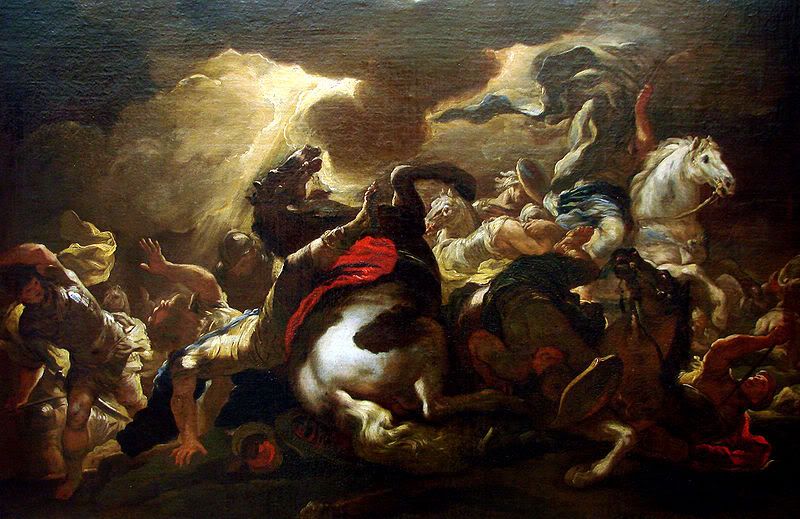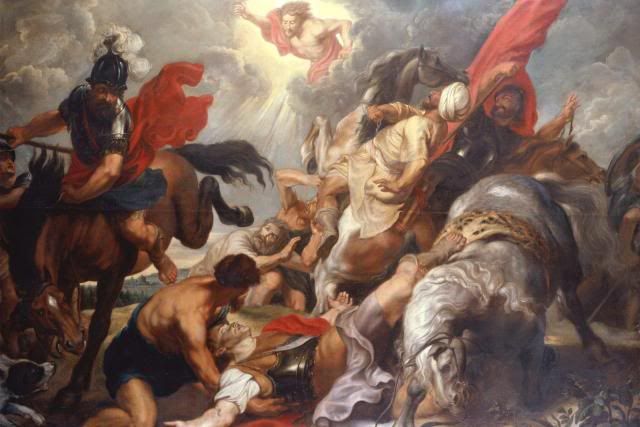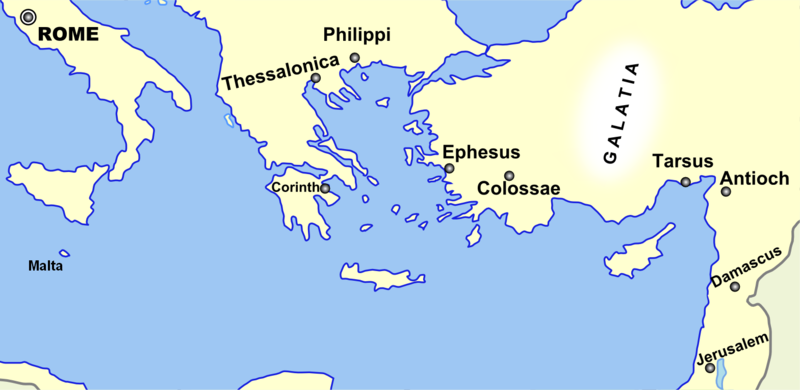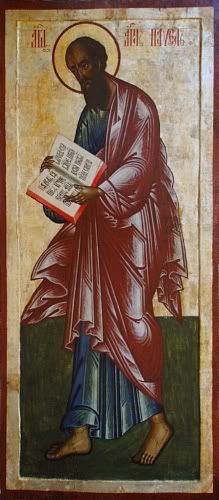January 25 marks the feast day of the Conversion of Saint Paul, while traveling on the road to Damascus. During this remarkable moment, Paul comes face to face with Jesus, who states, “I am Jesus, the one you are persecuting.” Paul’s heart is changed, as is his life. His encounter with Jesus transforms his beliefs, and his prolific theology springs forth, which he shares with all who will listen. For Paul, an everyday trip becomes the start of an extraordinary journey toward the Lord. And for him, the path to God is love.
Born in Tarsus to a noble family, Saint Paul was at first named Saul. His family, given the laws at the time, were bestowed the rights and privileges of citizens of the Roman Empire. Saul grew up instructed in Mosaic Law, which he strictly observed. Sent to Jerusalem to study, Saul mentored with the strictest and most prideful sect of Pharisees. As was the Jewish rule of the time, he also learned the craft of tent-making. During this time (36 A.D.), Christianity was spreading throughout the region, but was not to be tolerated.
Saint Stephen the Deacon was an early martyr of the church at that time. He was persecuted and put on trial by the Sanhedrin for preaching the message of Christ. Throughout his trial, he remained steadfast in his faith, with “the countenance of an angel.” Eventually, the observers, acting “as a single man,” rushed at him, dragged him from the city, and stoned him to death. While they were doing so, they laid their cloaks at the feet of Saul, who kept them—a sign at the times for responsibility of the execution. While he was dying, Saint Stephen pleaded for the forgiveness of his tormentors, including Saul. 60 He fell to his knees and cried out in a loud voice, “Lord do not hold this sin against them.” And with that he died. (Acts of the Apostles, 7:60) Saints and theologians credit Saint Stephen’s intercession as one of the precursors to the Lord’s conversion of Saul.
1 Saul, for his part, concurred in the act of killing. That day saw the beginning of a great persecution of the church in Jerusalem. (Acts of the Apostles, 8:1) By virtue of the power he had received from the high priest, Saul dragged Christians out of their homes, loaded them with chains, and thrust them into prison where they were tortured and oftentimes executed. He was ruthless and unmoved by their pleas for mercy. In the fury of his zeal he asked for permission to persecute all the Jews in Damascus who confessed to Jesus Christ, and to bring them in bonds to Jerusalem, that they might serve as examples for the others. It was with this permission that Saul, and his assistants, set off on the road to Damascus, where he would encounter the saving grace, and unquestionable patience and mercy of the Lord.
1 Saul, still breathing murderous threats against the Lord’s disciples, went to the high priest 2 and asked him for letters to the synagogues in Damascus which would empower him to arrest and bring to Jerusalem anyone he might find, man or woman, living according to the new way. 3 As he traveled along and was approaching Damascus, a light form the sky suddenly flashed about him. 4 He fell to the ground and at the same time heard a voice saying, “Saul, Saul, why do you persecute me?” 5 “Who are you, sir?” he asked. The voice answered, “I am Jesus, the one you are persecuting. 6 Get up and go into the city, where you will be told what to do.” (Acts of the Apostles, 9:1-6)
In his epistles, Paul details that while he was struck down and blinded, he experienced a vision of Jesus. But he further explains that vision does not fully capture the experience. Rather, an “illumination” of his life, and above all, a “revelation” of the vocation that will become his calling. He preaches throughout the world the mysteries of Christ, and the simple truth that conversion was not the result of a development of thought or reflection, but the fruit of divine intervention-- an unforeseeable, divine grace. Paul’s message is clear: Jesus Christ must remain the center of our lives, so that our identity is tied to his, just as Paul’s identity was reborn through his encounter with Christ. Our lives are made whole through the Eucharist, by communion with Christ, and in his Word which restores purity and virtue.
Saint Paul went on to preach throughout the Mediterranean. He authored thirteen epistles of the New Testament, spreading the word of God, and greatly contributing to the growth of the Church. The blasphemer and persecutor had become the greatest writer of that time.
Upon returning to Jerusalem (approximately 60 AD), Saint Paul was beheaded, a Christian martyr. His remains are buried at the Basilica of Saint Paul, outside the walls of Rome. Recent scientific inquiry into the remains, at the behest of Pope Benedict XVI, has confirmed their authenticity.
Pope Benedict XVI, in a general audience, spoke of Saint Paul, saying, “Clement of Rome, my Predecessor to this Apostolic See, wrote of [Paul of Tarsus] in the last years of the first century: ‘Because of jealousy and discord, Paul was obliged to show us how one obtains the prize of patience.... After preaching justice to all in the world, and after having arrived at the limits of the West, he endured martyrdom before the political rulers; in this way he left this world and reached the holy place, thus becoming the greatest model of perseverance.’”
Saint Paul was a tireless preacher of the truth of Christ’s love, his letter beautiful and elegant instruction in the salvation of the Lord. But he is the same man, Saul, who ceaselessly persecuted Christians, prior to his meeting Jesus on the road to Damascus. In considering that meeting, we are struck by his amazing conversion, his rebirth into life through the love and saving grace of Christ. No longer was redemption bound by the law, or acquired through works, but instead, assured through commitment to Christ and his loving forgiveness. We are left with the certainty that if the Lord can enable Saul to start anew as Saint Paul, He will change us for the better if we believe whole-heartedly and with conviction. Called to conversion on a daily basis, today we pause to examine what we could do better, and ask our Lord to change our hearts.
38 For I am certain that neither death nor life, neither angels nor principalities, neither the present nor the future, nor powers, 39 neither height nor depth nor any other creature, will be able to separate us from the love of God that comes to us in Jesus Christ, our Lord. (Romans 8:38-39)
Day 25 of 365
Prayer Intentions: True Conversion; Those suffering in the aftermath of the Haitian earthquake
Requested Intentions: Safety for friend deployed to Afghanistan (S); Those considering or having attempted suicide (Pr. L); Those who serve the Archdiocese of Los Angeles (N); Safety of friend/ relief worker in Haiti (L); Health and safety of new daughter (J); Renewal of loving Christ-centered relationship (A).
Why pray the Rosary every day for a year?
Each time the Blessed Virgin has appeared-- whether it be to Saint Bernadette Soubirous at Lourdes; to Lucia, Jacinta, and Francisco at Fatima; or to Mariette Beco at Banneux-- she has asserted the importance, saving grace, and power of praying the Holy Rosary on a daily basis. Based upon her words, the Rosary is penance and conversion for sinners, a pathway to peace, an end to war, and a powerful act of faith in Jesus Christ. Pope Paul VI presented the Rosary as a powerful means to reach Christ "not merely with Mary but indeed, insofar as this is possible to us, in the same way as Mary, who is certainly the one who thought about Him more than anyone else has ever done."
To show us how this is done, perhaps no one has been more eloquent than the great Cardinal Newman, who wrote: "The great power of the Rosary consists in the fact that it translates the Creed into Prayer. Of course, the Creed is already in a certain sense a prayer and a great act of homage towards God, but the Rosary brings us to meditate again on the great truth of His life and death, and brings this truth close to our hearts. Even Christians, although they know God, usually fear rather than love Him. The strength of the Rosary lies in the particular manner in which it considers these mysteries, since all our thinking about Christ is intertwined with the thought of His Mother, in the relations between Mother and Son; the Holy Family is presented to us, the home in which God lived His infinite love."
As Mary said at Fatima, "Jesus wants to use you to make Me known and loved. He wishes to establish the devotion to My Immaculate Heart throughout the world. I promise salvation to whoever embraces it; these souls will be dear to God, like flowers put by Me to adorn his throne."

Subscribe to:
Post Comments (Atom)












0 comments:
Post a Comment
Thanks for leaving a comment. If you wish to submit a prayer request, however, please do so above, using the "Contact" tab.